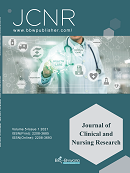Practice and Effect Evaluation of Drug Reorganization in Patients with Chronic Obstructive Pulmonary Disease
Abstract
Objective: To explore the feasibility of drug reorganization in clinical practice through the drug reorganization service of clinical pharmacists for patients with chronic obstructive pulmonary disease (COPD) in respiratory and critical care department, and to evaluate the effect of the service in multiple dimensions. Methods: a total of 100 patients with COPD admitted from January to July 2021 were randomly divided into two groups with 50 patients in each group. One group was treated with drug reforming intervention and the other group was not treated with intervention. Statistics and data analysis were carried out from three aspects: patient compliance, satisfaction and medication deviation. Results: (1) compliance: 48h after admission, there was no significant difference between the two groups (P>0.05); According to the data statistics on the day of discharge and after one month, the compliance of the two groups was statistically significant (P<0.05), which was higher in the reorganization group. (2) Satisfaction: There was no significant difference between the two groups after admission. However, after drug reforming intervention by pharmaceutical staff, the results of reforming group were better and statistically significant (P<0.05). (3) Medication deviation: There were 50 deviations in the reorganization group, of which drug omission accounted for 52%, which was the main factor. After communicating with clinicians, the clinicians’ acceptance rate of the reorganization scheme reached 94.12%. Conclusion: The implementation of drug reorganization service can effectively prevent the medication deviation of COPD patients, save the cost of patients, improve the satisfaction and compliance, and ensure the medication safety of patients.
References
Xie Y, Liu C, Zhuang H, et al., 2021, Discussion on the Medication law of Liu Xiaohong in the Treatment of Chronic Obstructive Pulmonary Disease. Journal of Guangzhou University of Traditional Chinese Medicine, 38 (4): 810-815. Doi: 10.13359/j.cnki.gzxbtcm. 021.04.029
He H, Guo S, Song Y, et al., 2020, Study on the Medication Law of Professor Sun Zengtao in the Treatment of Chronic Obstructive Pulmonary Disease based on Data Mining. Chinese Traditional Medicine Emergency, 29 (4): 604-607. Doi: 10.3969/j.issn.1004-745X.2020.04.011
Yang Y, Li G, Zhang Z, et al., 2021, Practice of Pharmaceutical Intervention by Clinical Pharmacists in Respiratory Medicine. Modern Medicine and Health, 37(9): 1582-1585. Doi: 10.3969/j.issn.1009-5519.2021.09.045
Zhao F, Qin Y, Zhang X, et al., 2021, Analysis of Inpatient Drug Reorganization in Gastroenterology Department. Chinese Journal of Hospital Pharmacy, 41(11): 1142-1145. Doi: 10.13286/j.1001-5213.2021.11.11
Zhao S, Fan P, Cai H, et al., 2021, Experience of Clinical Pharmacists in Drug Reorganization in the Practice of Antithrombotic Drug Treatment. Henan Medical Research, 30(18): 3371-3374. Doi: 10.3969/j.issn.1004-437x.2021.18.032
Wu W, Zhang R, Liu H, et al., 2018, Implementation and Clinical Evaluation of Whole Process Pharmaceutical Care for Patients with Chronic Obstructive Pulmonary Disease. China Medicine and Clinic, 18(5):718-720. Doi: 10.11655/zgywylc2018.05.019


